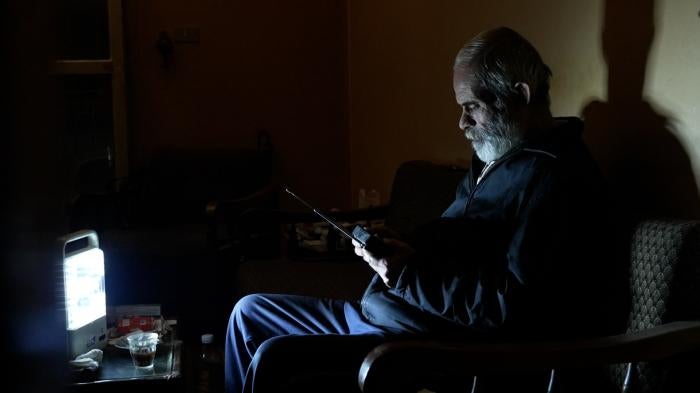Lebanon: Electricity Crisis
Read a text description of this video
Khodr Al Hawshi:
The darkness affects me a lot. Can anyone live without light?
Narration:
This is the daily reality for Khodr, a man in his seventies. Like the over the 6 and a half million people in Lebanon,he gets an average of only two hours of state provided electricity every day.Electricity blackouts have been a persistent problem due to decades of state corruption and mismanagement. But it got even worse recently because Lebanon is suffering one of the worst economic crisis in its history. Since 2019, its currency has lost 95% of its value. This means the state, still reliant on fossil fuels, can’t afford the imports to run its power stations.
Khodr Al Hawshi: Before things were manageable. We’d have electricity for three hours, then off for three. It was tolerable. Day or not, we get it for an hour [but] we aren’t really aware of it.
Narration:
The lack of electricity has a severe impact on the rights to an adequate standard of living, education, health, and livelihood. The Lebanese government has an obligation to ensure that all residents have a continuous, affordable, and clean supply of electricity. Without electricity, Khodor has no running water.
Khodr Al Hawshi:
If I want to cook, I buy myself a gallon of water. I use it to wash the vegetables and I cook only a little bit because I can’t put anything in the fridge since there’s no electricity.
Narration:
In order to cope, many people have subscriptions for private diesel generator providers but these are unaffordable for many. The generator industry, a multi-billion-dollar business, operates with almost no regulation and monitoring.
Khodr Al Hawshi:
The reason I don’t have a subscription is because I cannot afford it.
Narration
The Lebanese government should reform the electricty sector in line with its human rights obligations. International donors should invest in helping Lebanon transition to renewable sources of energy.
Khodr Al Hawshi: Some people have subscriptions on the street so I feel some light. This lifts my spirits a bit, when I see the light. It breaks the darkness and makes you happier, a bit.
(Beirut, March 9, 2023) – Lebanese authorities have failed to uphold the right to electricity by mismanaging the sector for decades, Human Rights Watch said in a report released today.
The 127-page report, “‘Cut Off from Life Itself’: Lebanon’s Failure on the Right to Electricity,” argues that electricity is fundamental to nearly every aspect of living and participating in present- day societies, and as such, the internationally protected right to an adequate standard of living includes the right of everyone, without discrimination, to sufficient, reliable, safe, clean, accessible, and affordable electricity. At present, the government provides electricity for only one to three hours a day on average, while people who can afford it supplement that supply with private generators. The public sector and private generator industry rely on polluting climate-intensive fossil fuels. The electricity crisis has exacerbated inequality in the country, severely limited people’s ability to realize their most basic rights, and pushed them further into poverty.
